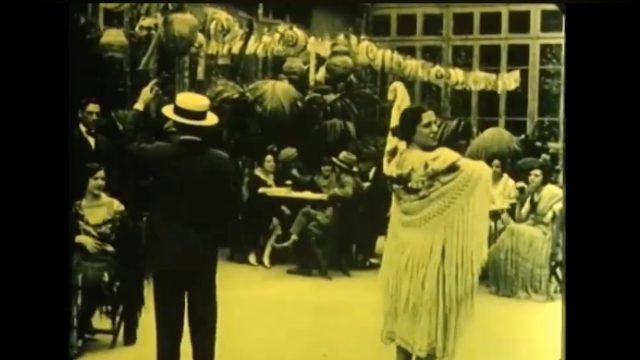SUMMARY
This is AI generated summarization, which may have errors. For context, always refer to the full article.

The 12th International Silent Film Festival, traditionally held at SM Megamall during the last week of August is “the only silent film festival in the whole of Asia… And the only one of its kind that matches international silent films with very talented Filipino musicians of all kinds.”
This is what Teddy Co said over post-festival cocktails at Brotzeit in nearby Shangri-La Plaza.
A walking encyclopedia on film and film history, Co is a Commissioner for the Arts, and Chair of the Cinema Committee of the National Commission for the Culture and the Arts (NCCA). He is also the consultant of the Filipino film program of the ISFF through the Film Development Council of the Philippines (FDCP).
“An international organization monitors silent film festivals and events around the world; they list no other such silent film festival in Asia except the ISFF,” said Co.
Unfortunately – said Co – “There are no Filipino silent films that are extant. All of them are gone, because we didn’t have a proper archive.”
“There are no surviving pre-war films anymore. A lot of films were also lost during the (second world) war. And maybe 80 % of the the films made in the 1940s, 1950s, and 1960s (post-silent film era), are gone. This is a way of waking up to the importance of finding and preserving and restoring our film heritage, because it is very important. It is us. Good or bad, they are about the Philippines and the soul of the Filipino,” Co added.
Some years ago though, concerned members of the film industry and archivists decided to come up with a solution, and that is to make “original Filipino silent movies.” Quite a number of Filipino filmmakers responded to this call and filmmaker Khavn De La Cruz – better known as “Khavn” – was one of them.
During the Silent filmfest, the Philippines presented “The Lost Film Trilogy” consisting of Filipiniana, 2016; Aswang, 2017; and Juan Tamad Goes to the Moon, 1898; and an excerpt from Nitrate: To the Ghosts of the 75 Lost Philippine Silent Films (1912-1933), 2013, all scored live by director Khavn & the Kontra-Kino Orchestra.
Co clarified that Khavn’s Aswang was based on the first silent Filipino Film Ang Aswang which was made in 1933.
“This is the first time that the filmmaker of the film composed and performed his own music to his film. This has never happened before, for the simple reason that the filmmakers of practically all silent films are six feet under. Patay na, pati buong cast.”
Of the four films presented during the fest, “three of them are original in [Khavn’s] usual style of very, very punk and provocative type of films. One is a found footage film from a number of horror movies,” Co said.
The first 3 films were “not exactly old films.” But he added that “the program is designed to showcase the importance of film archiving, our film heritage; the Filipino film heritage.”
With the exception of United Kingdom, all the participants of last year’s festival screened films again this year.
Italian artistocrat Dame Alba d’ Oltrevita (Lyda Borelli) makes a pact with the devil for a chance to be young and beautiful again in Nino Oxilia’s Rapsodia Sanatica (Satanic Rhapsody), a stylish Italian melodrama done sometime between 1915 to 1917, and which was restored by Cineteca di Bologna in 2015. The film was scored live by Miles Experience.
France showcased La Passion de Jeanne D’Arc (The Passion of Joan of Arc), a 1928 co-production with Danish director Carl Theodor Dreyer, which essays the story of the 1431 trial of Joan of Arc, who “was accused of heresy by ecclesiastical judges.” The film was scored by pianist, vocalist, composer, conductor and musical director Dingdong Fiel, who played the score live with Andrew Constantino on clarinet, and Kyongmin Nam on cello.
Germany’s first true horror film Das Cabinet des Dr. Caligari (The Cabinet of Dr. Caligari), 1920 — about a mad doctor who allegedly “sends a reawakened corpse on a killing spree” and who turns out to be the director of an insane asylum — was scored live by UP-based gamelan ensemble Kontra-Gapi.
Yazujiro Ozu’s Tokkan Kozo (A Straightforward Boy), 1929 from Japan is the shortest silent film for this batch at 19 minutes, about a kidnapping gone awry. This comedy was scored live by Naga-based Tanikala band, and featured the first-ever Filipino benshi (narrator-cum-voice actor) Ateneo de Naga University professor and film critic Tito Genova Valiente.
The United States featured anew another masterpiece by director Buster Keaton, the 1923 comedy/romance/thriller Our Hospitality, which was scored live by the Brass Munkeys.
What better excuse to feature dance shows in lively Madrid, Spain in 1926 but a silent musical comedy titled Frivolinas? The film was scored live by Tapati, a Philippine neo-ethnic tribal music group.
The festival was closed by Robert Land’s 1929 drama Die Klein Veronika about a mountain girl who travels to Vienna, Austria for the first time for her confirmation; and things do not turn out as she had expected. Avant-pop electronica musician and multimedia artist Joee & I did the live score with her friends.
“It was a great collaboration between (and among) all the cultural institutes in Manila. It’s very enjoyable. We had fun doing it,” said Instituto Cervantes Cultural Programmer Jose Maria Fons. He said that the annual event is significant in that it allows collaboration between the Philippines and other countries, and showcases heritage films scored live by contemporary musicians from the Philippines. – Rappler.com
For videos of the films that were exhibited at the festival, check out the ISFF 2018 Facebook page.
Add a comment
How does this make you feel?
There are no comments yet. Add your comment to start the conversation.